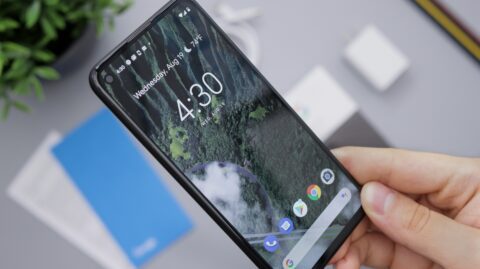Introduction to Smartphone Reviews
Welcome to the ultimate guide to smartphone reviews! In today’s fast-paced world, smartphones have become an essential part of our lives. From staying connected with friends and family to managing our work and entertainment on the go, these pocket-sized devices have revolutionized the way we live. But with countless options flooding the market, how do you choose the right one for you? That’s where smartphone reviews come in handy! In this comprehensive guide, we’ll explore key features to consider, compare operating systems, delve into camera quality and performance, discuss battery life and durability, analyze user experience and interface – all so that you can make an informed decision when it comes to your next smartphone purchase. So buckle up as we embark on this journey together – let’s dive right into the world of smartphone reviews!
Key Features to Consider
When it comes to choosing a smartphone, there are several key features that you should consider before making your final decision. These features will not only impact the performance of your device, but also determine how well it meets your needs and preferences.
First and foremost, one of the most important features to look for is the processor. This is essentially the brain of your smartphone and will dictate its speed and multitasking capabilities. Whether you’re a heavy gamer or just someone who wants smooth navigation through apps and websites, a powerful processor is essential.
Next up is storage capacity. With so many photos, videos, music files, and apps to store these days, having ample storage space is crucial. Look for smartphones with expandable memory options or large internal storage capacities if you’re planning on storing a lot of media on your device.
Another feature to keep in mind is display quality. A vibrant and sharp display can greatly enhance your overall viewing experience whether you’re watching movies or scrolling through social media feeds. Consider factors such as screen size, resolution, color accuracy, and brightness levels when evaluating different smartphones.
Camera enthusiasts should pay close attention to camera quality as well. The megapixel count isn’t the sole indicator of great image quality – factors like aperture size (lower values mean better low-light performance), optical image stabilization (reduces blur), and software enhancements also matter.
Lastly – but certainly not least – battery life should be taken into consideration too! After all what good would an amazing phone be if it ran out of juice halfway through the day? Look for phones with larger battery capacities or ones that support fast charging technology so that you can stay connected throughout the day without worrying about running out of power.
Remember: each person has their own unique set of requirements when it comes to choosing a smartphone; make sure those needs align with the key features offered by different devices before making any hasty decisions! Keep these considerations in mind as you begin your search for the perfect smartphone that ticks all the right boxes for you.
Operating Systems: Android vs iOS
When it comes to choosing a smartphone, one of the biggest decisions you’ll have to make is between the two major operating systems: Android and iOS. Each has its own strengths and weaknesses, so it’s important to consider what matters most to you.
Android, developed by Google, offers a wide variety of options from different manufacturers like Samsung, LG, and Google themselves. It allows for greater customization with widgets on your home screen and the ability to download apps from multiple sources. With Android, you can also take advantage of features like expandable storage and easy file transfers.
On the other hand, iOS is exclusive to Apple devices such as iPhones and iPads. While it may not offer as much customization as Android, iOS provides a seamless user experience with its intuitive interface. The App Store boasts an extensive selection of high-quality apps that are tightly controlled for security purposes.
Your choice between Android and iOS will depend on your personal preferences in terms of device options, customization capabilities,
and app ecosystems. If you value versatility and freedom in customizing your phone’s appearance or if having access to a wide range
of manufacturers appeals to you then go for Android! However if user-friendly interfaces coupled with industry-leading app quality resonate more with you then opt for iOS!
Price Range and Budgeting
Price Range and Budgeting
When it comes to purchasing a smartphone, one of the most important factors to consider is your budget. It’s crucial to set a realistic price range before you start searching for the perfect device. With so many options available on the market, it can be easy to get overwhelmed by flashy features and expensive models.
Setting a budget will help you narrow down your choices and prevent overspending. Take some time to evaluate how much you’re willing to invest in a new phone. Consider your needs and prioritize them accordingly.
Once you have determined your price range, do thorough research on smartphones within that bracket. You may find that there are plenty of great options at different price points, each offering unique features and benefits.
Remember not to compromise too much on quality just because of a lower budget. Look for well-established brands that offer reliable performance even in their mid-range devices.
Consider buying previous generation models if they fit within your preferred price range as they often come with discounted prices without sacrificing too much in terms of functionality or performance.
By establishing a clear budget from the beginning, you’ll avoid unnecessary stress or disappointment during the selection process while ensuring that you make an informed decision based on both affordability and value for money.
Camera Quality and Performance
One of the most important factors to consider when choosing a smartphone is its camera quality and performance. After all, we use our smartphones not only for communication but also as our go-to device for capturing life’s moments.
When it comes to camera quality, there are several key features to look out for. First and foremost is the resolution – the higher the number of megapixels, the sharper and more detailed your photos will be. Additionally, optical image stabilization can greatly improve image clarity by reducing blurring caused by shaky hands or movement.
But it’s not just about megapixels and stabilization. The lens aperture also plays a crucial role in determining how well a smartphone camera performs in low-light conditions. Look for a wider aperture (lower f-number) as this allows more light into the sensor resulting in brighter and better-exposed photos even in dimly lit environments.
Another aspect to consider is the ability to shoot in various modes such as portrait mode, night mode, or even manual mode if you’re an enthusiast who likes full control over their shots. Some smartphones offer advanced AI algorithms that can enhance images through automatic scene recognition, optimizing settings accordingly.
Don’t forget about video recording capabilities! Look for smartphones that support high-resolution video recording with options like 4K or even 8K resolution if you want to future-proof your device.
In conclusion,
when evaluating smartphone cameras’ quality and performance, remember to consider factors such as resolution, image stabilization, lens aperture size, shooting modes availability (including AI technologies), and video recording capabilities.
Battery Life and Durability
Battery Life and Durability are two crucial factors to consider when choosing a smartphone. After all, what good is a high-performing device if it dies on you within a few hours? And let’s not forget about the importance of durability – no one wants a phone that can’t withstand accidental drops or spills.
When it comes to battery life, look for smartphones with larger battery capacities. This means more mAh (milliampere-hour), which directly correlates to longer usage time. Additionally, pay attention to whether the phone has fast charging capabilities. This feature allows you to quickly recharge your device in case you’re running low on power.
Durability is equally important as we tend to carry our phones everywhere we go. Look for devices with sturdy build quality and materials such as metal or Gorilla Glass protection for added resistance against scratches and cracks.
Water and dust resistance ratings are also worth considering, especially if you lead an active lifestyle or frequently find yourself in situations where your phone may come into contact with moisture or debris.
Remember that each smartphone brand will have its own level of battery life and durability performance, so be sure to read reliable reviews from both experts and users before making your final decision.
User Experience and Interface
When it comes to smartphones, user experience and interface play a crucial role in determining whether a device is easy and enjoyable to use. A smooth and intuitive interface can greatly enhance your overall smartphone experience.
One important aspect of the user experience is the responsiveness of the touchscreen. Nobody wants to deal with sluggish or unresponsive touchscreens that hinder navigation and frustrate users. Look for smartphones with high-quality touchscreens that offer fast response times.
Another key factor is the simplicity and intuitiveness of the operating system’s layout. Both Android and iOS have their own unique interfaces, so choose one that aligns with your preferences. Consider factors such as ease of navigation, organization of settings, and customization options.
Additionally, pay attention to how well apps integrate into the overall user interface. Are they seamlessly integrated or do they feel disjointed? This can greatly impact your daily use if you rely on specific apps frequently.
Furthermore, consider ergonomics – how comfortable a smartphone feels in your hand while using it one-handed or typing messages quickly without strain.
When evaluating user experience and interface in smartphone reviews, look for devices that offer a responsive touchscreen, an intuitive operating system layout, seamless app integration, and ergonomic design for optimal usability. By considering these factors within each review you read will help guide you towards finding a smartphone that offers an exceptional user experience!
Expert Reviews vs User Reviews
When it comes to choosing a smartphone, there is an abundance of information available at our fingertips. One important aspect to consider is whether to rely on expert reviews or user reviews. Both sources have their merits and can provide valuable insights for your decision-making process.
Expert reviews, often written by tech journalists and industry experts, offer in-depth analysis and comparisons of different smartphones. These reviews are typically comprehensive and cover various aspects such as design, performance, camera quality, battery life, software features, and more. They are usually based on extensive testing and hands-on experience with the devices.
On the other hand, user reviews offer a different perspective as they come from everyday consumers who have actually used the smartphones in real-life scenarios. User reviews provide firsthand accounts of personal experiences with the device – both positive and negative. They can highlight specific features that users find useful or frustrating.
It’s important to note that while expert opinions may carry weight due to their technical expertise, user reviews reflect actual usage patterns which can be helpful when considering factors like long-term reliability or customer service experiences.
To make an informed decision about which source to trust more heavily – expert or user review – it’s best to consider them as complementary rather than mutually exclusive resources. Combining insights from both types of reviews will give you a well-rounded understanding of a smartphone’s strengths and weaknesses.
Remember that individual preferences play a significant role in determining what makes a particular phone suitable for one person but not another. Finding the right balance between expert evaluations and user feedback will help guide you towards selecting the perfect smartphone that meets your unique needs!
How to Choose the Right Smartphone for You
Choosing the right smartphone can be a daunting task with so many options available in the market. However, armed with the knowledge of what to look for and how to evaluate different features, you can make an informed decision that perfectly aligns with your needs and preferences.
When it comes to choosing the right smartphone for you, it’s important to consider factors such as operating systems, price range, camera quality, battery life, durability, user experience, and expert as well as user reviews. Each individual has unique requirements and priorities when it comes to smartphones.
Identify whether you prefer Android or iOS as your operating system. Both have their own strengths and weaknesses which will impact your overall experience using the device.
Next up is budgeting – determine how much you are willing to spend on a smartphone. This will help narrow down your options within a specific price range without compromising on essential features.
Camera quality is often a top priority for many users nowadays. If photography is important to you, pay close attention to camera specifications like megapixel count, aperture size, image stabilization technology etc., making sure they meet your expectations.
Battery life plays a crucial role in today’s fast-paced lifestyle where we heavily rely on our smartphones throughout the day. Look for devices with larger battery capacities or optimized power management systems that can keep up with your usage patterns.
Durability is another factor worth considering if you tend to be rough on your devices or work in environments where accidents are likely. Opt for smartphones made from sturdy materials like Gorilla Glass or those featuring water-resistant capabilities.
User experience and interface should not be overlooked either – choose a phone that offers intuitive navigation along with customization options suited to your personal taste and convenience.
Lastly but equally important are expert reviews versus user reviews. While experts provide valuable insights based on technical assessments of performance and features; real-life experiences shared by users offer practical feedback regarding everyday usage scenarios worth taking into account before making a decision.
The ultimate guide to smartphone reviews has provided you with a comprehensive







